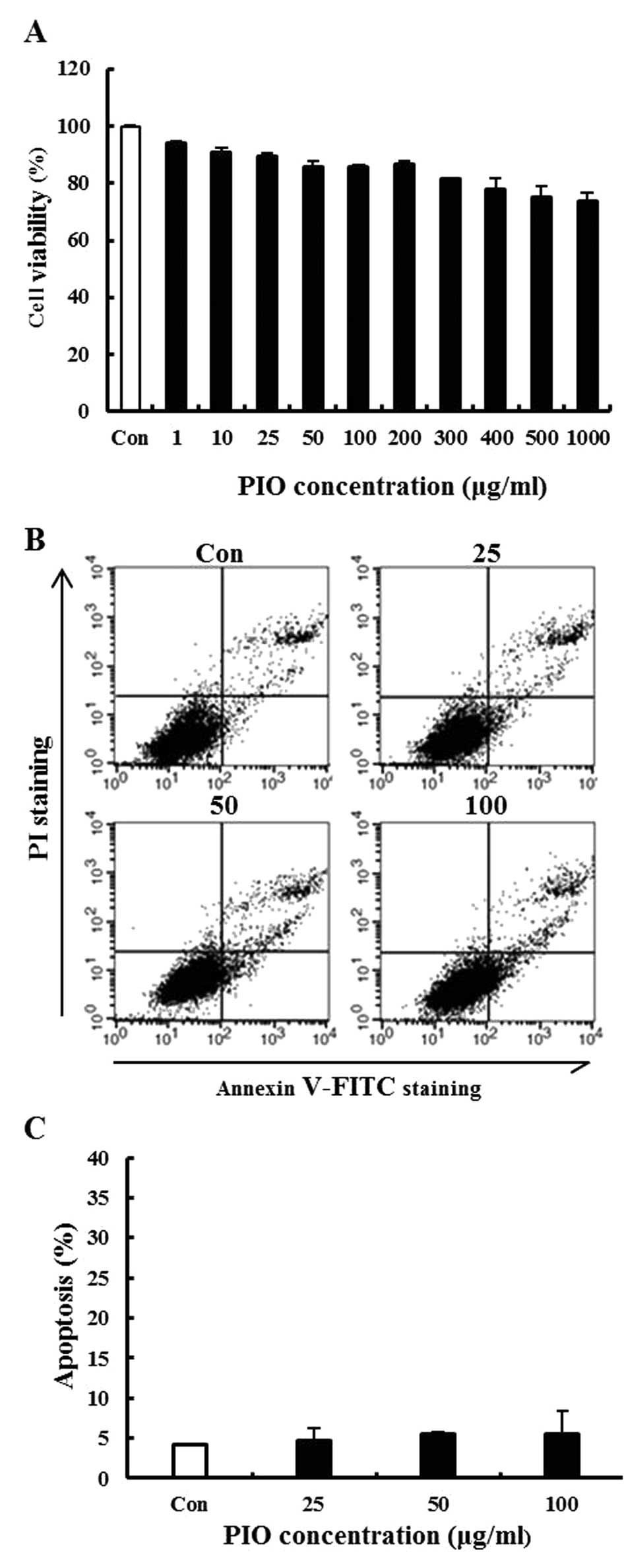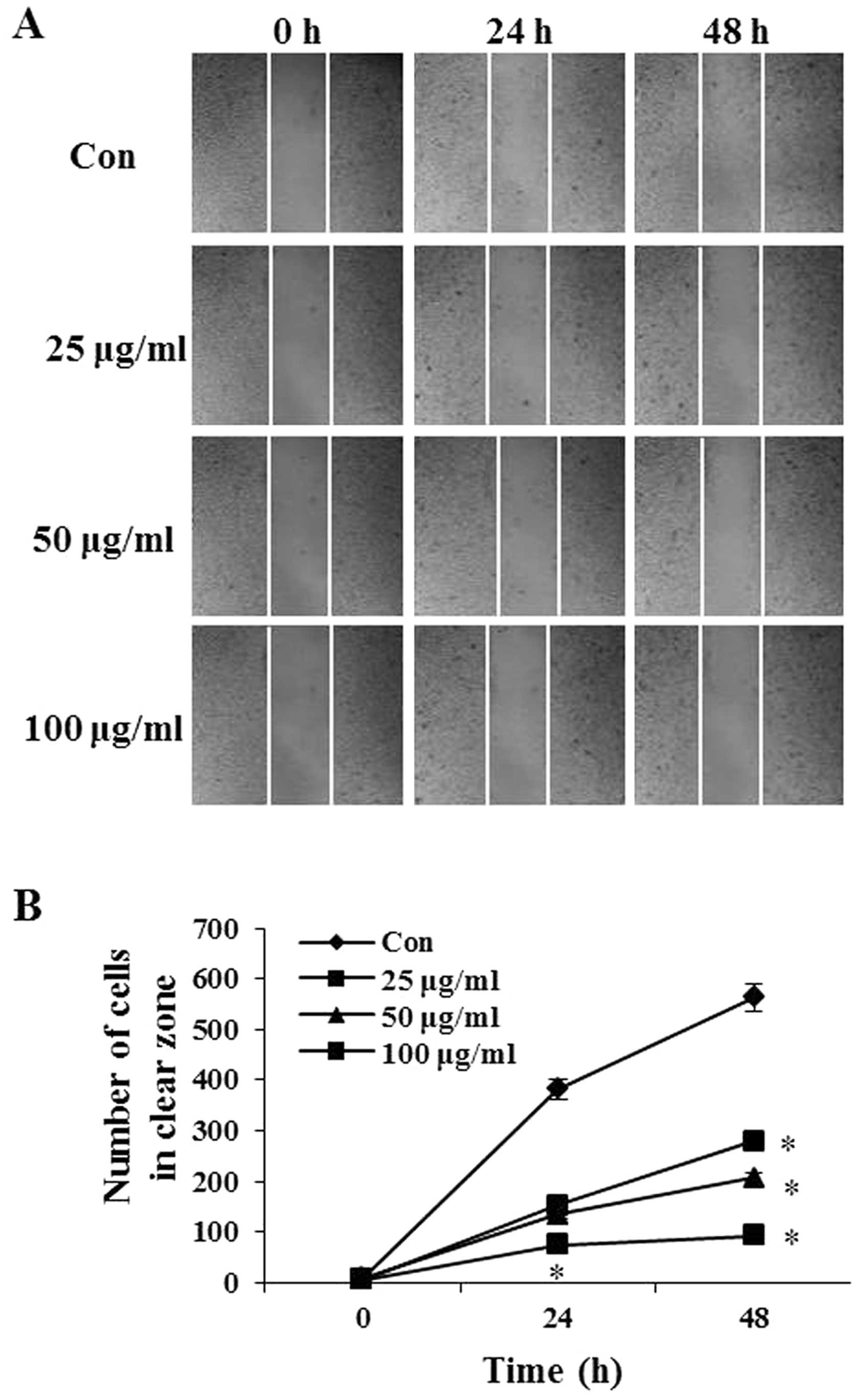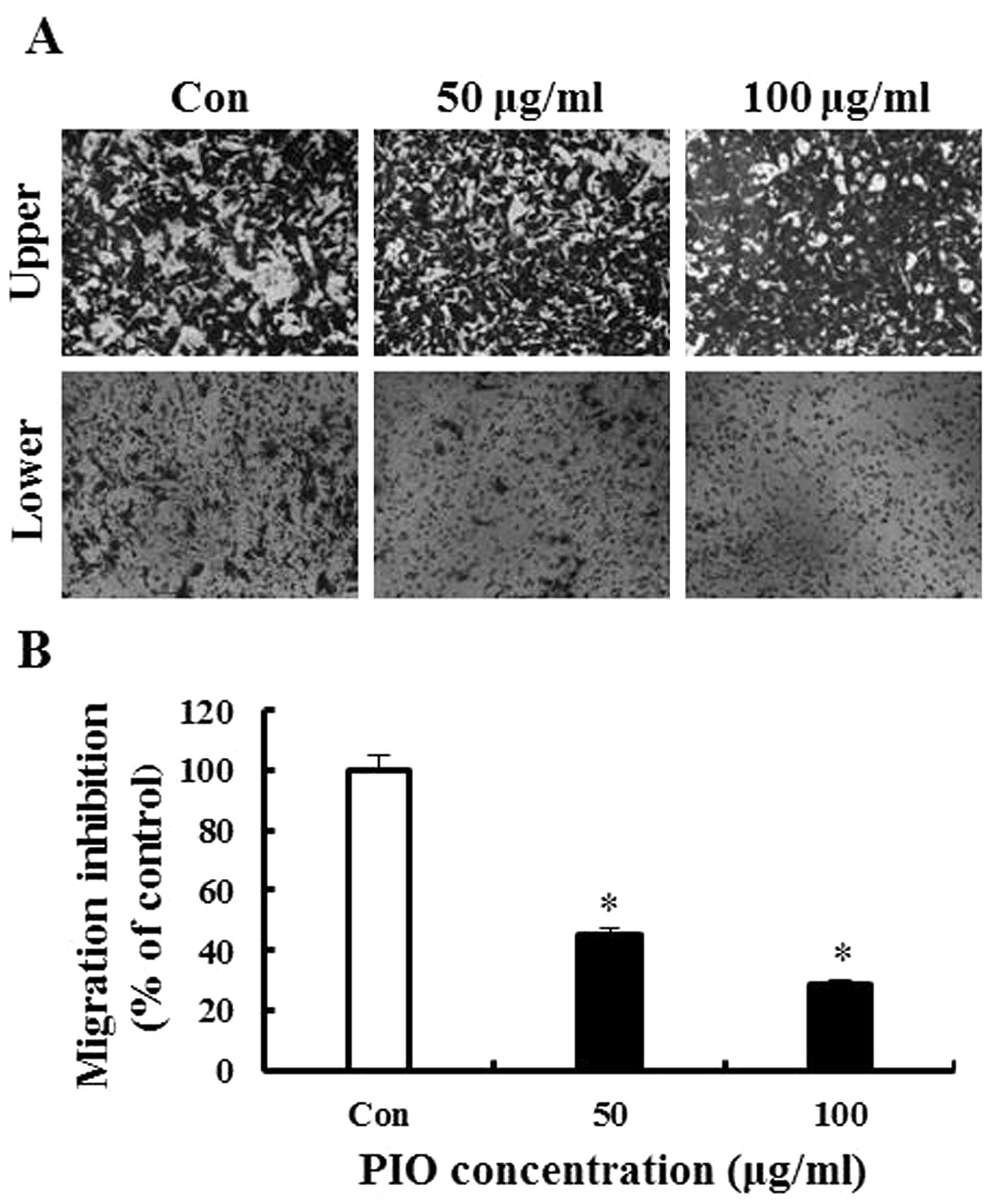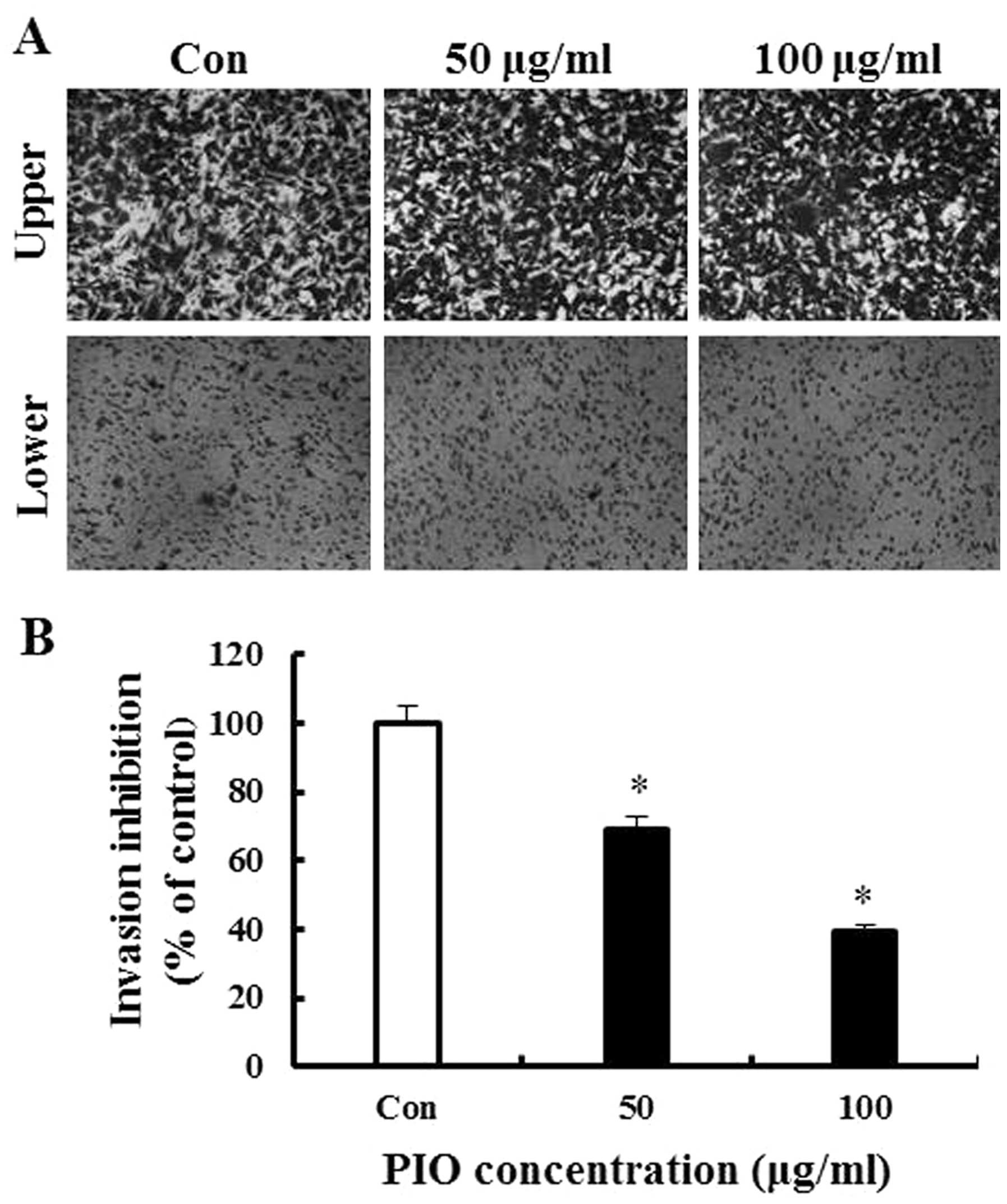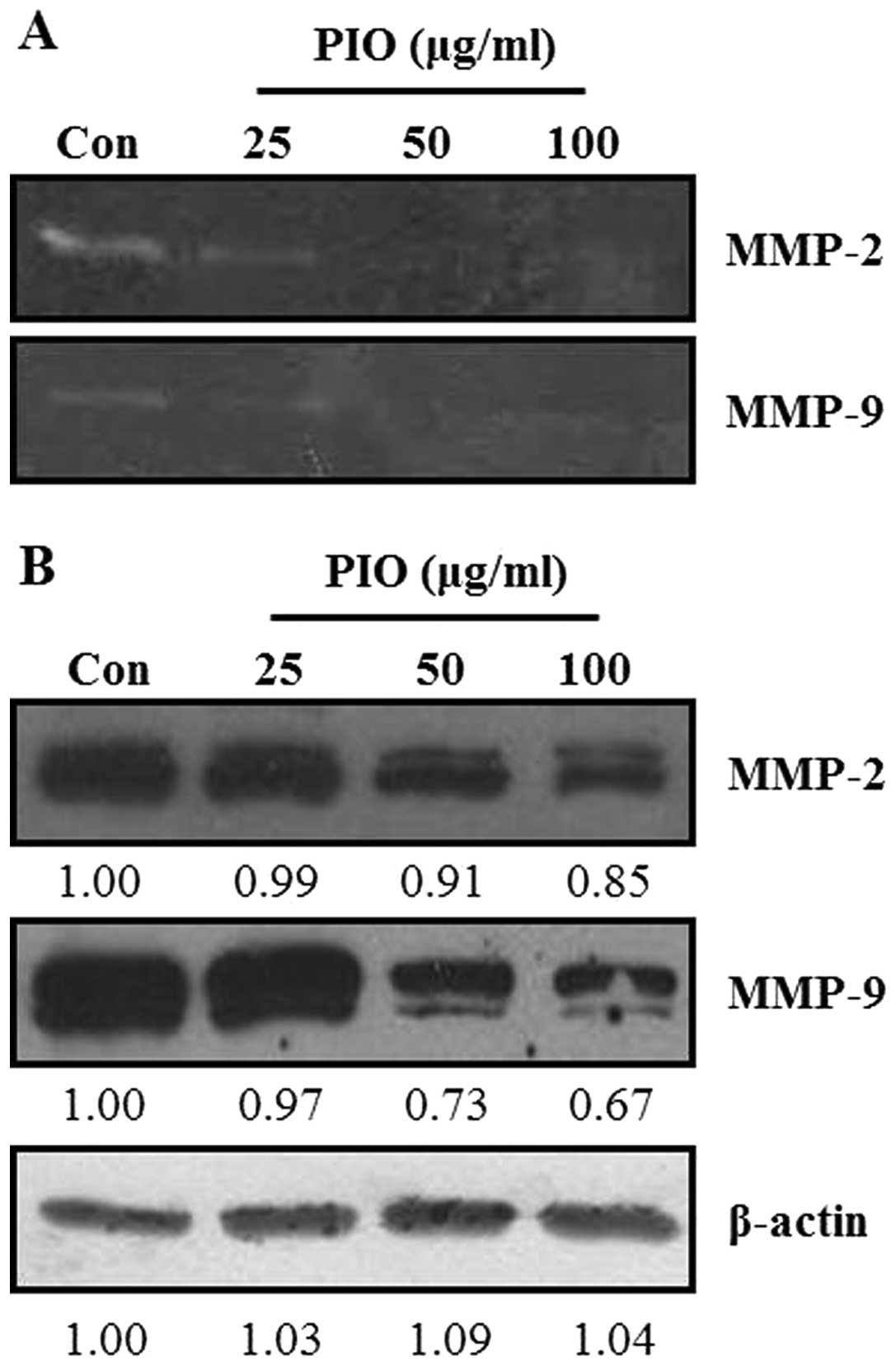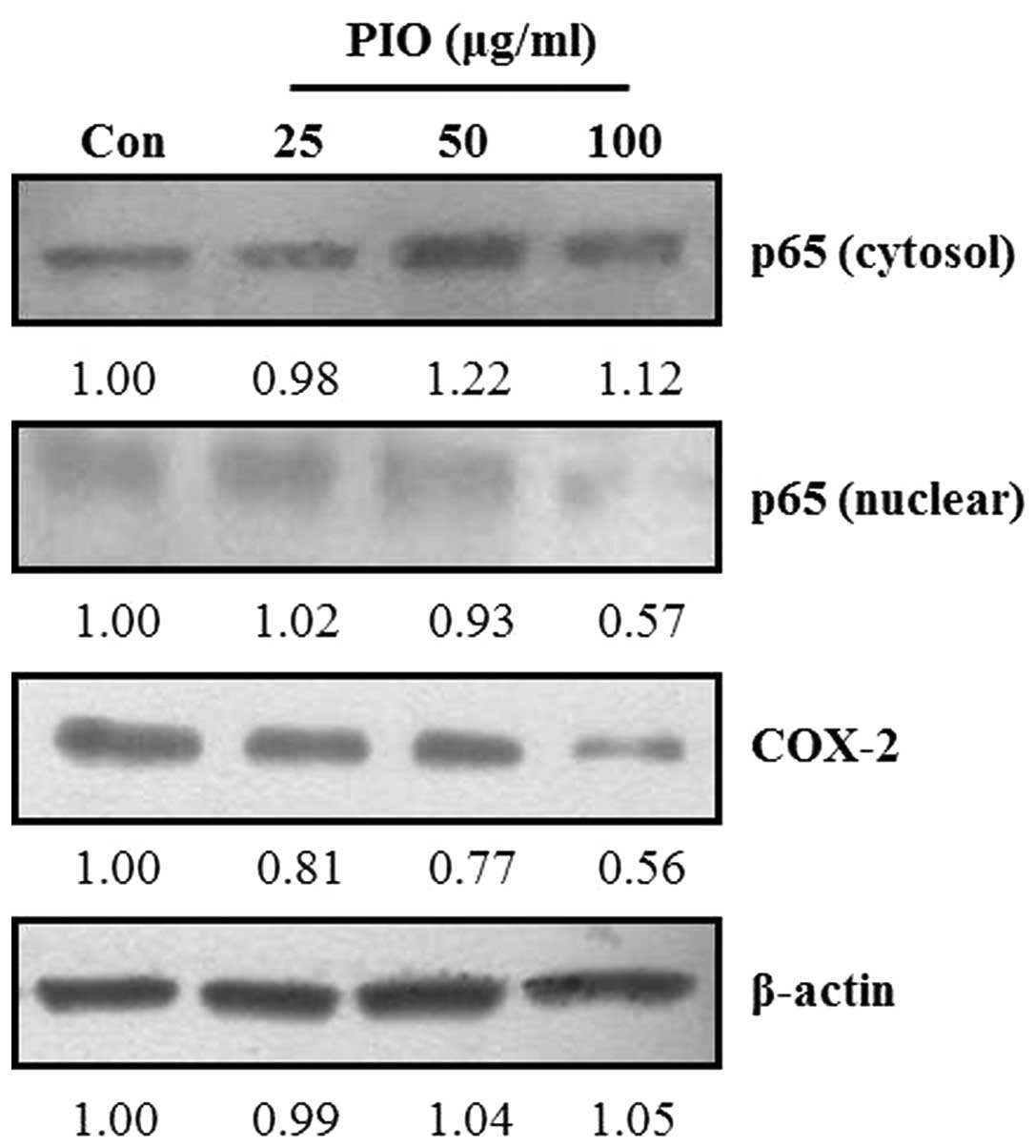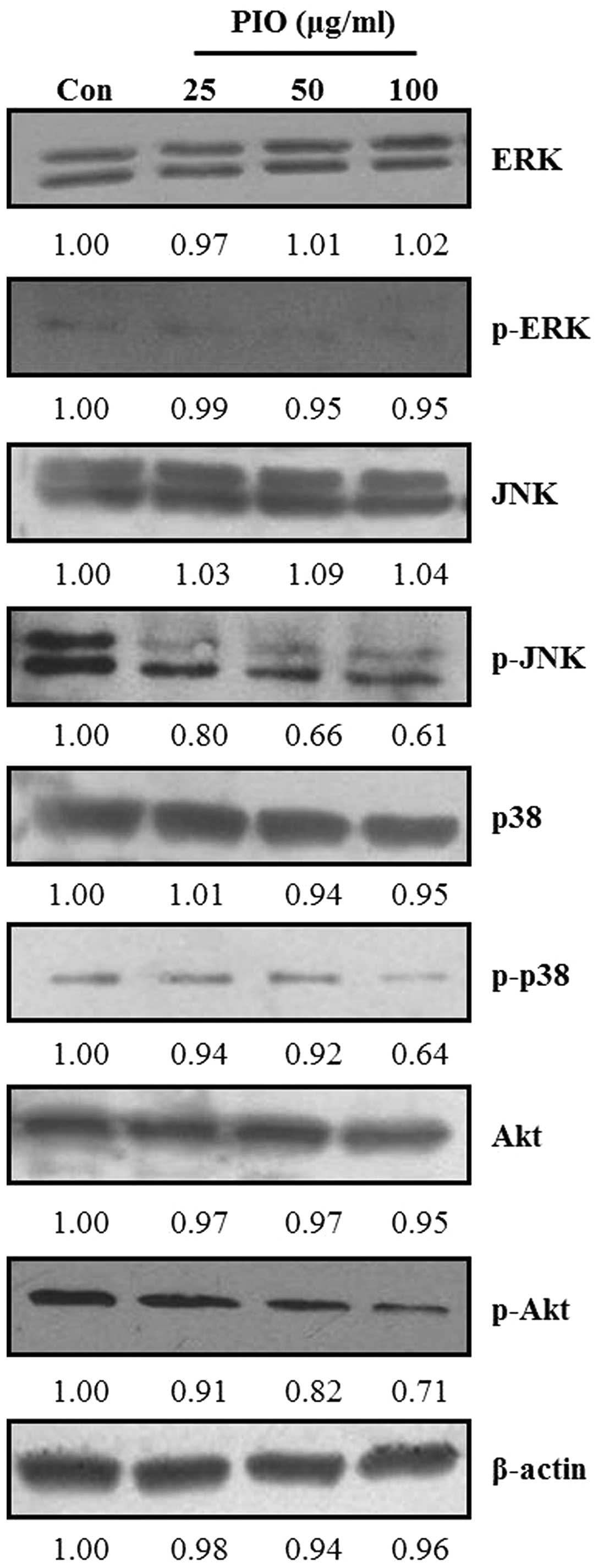|
1
|
Monks NR, Biswas DK and Pardee AB:
Blocking anti-apoptosis as a strategy for cancer chemotherapy:
NF-κB as a target. J Cell Biochem. 92:646–650. 2004.PubMed/NCBI
|
|
2
|
Walsh V and Goodman J: Cancer
chemotherapy, biodiversity, public and private property: the case
of the anti-cancer drug taxol. Soc Sci Med. 49:1215–1225. 1999.
View Article : Google Scholar : PubMed/NCBI
|
|
3
|
Rosenberg SA and Dudley ME: Cancer
regression in patients with metastatic melanoma after the transfer
of autologous antitumor lymphocytes. Proc Natl Acad Sci USA.
101(Suppl 2): S14639–S14645. 2004. View Article : Google Scholar : PubMed/NCBI
|
|
4
|
Solari N, Acquati M, Queirolo P, et al:
Primary melanoma of the esophagus with non-metastatic dark lymph
nodes in a female breast cancer patient. Anticancer Res.
27:2849–2853. 2007.PubMed/NCBI
|
|
5
|
Han JY, Kim HS, Lee SH, Park WS, Lee JY
and Yoo NJ: Immunohistochemical expression of integrins and
extracellular matrix proteins in non-small cell lung cancer:
correlation with lymph node metastasis. Lung Cancer. 41:65–70.
2003. View Article : Google Scholar : PubMed/NCBI
|
|
6
|
Ichikawa Y, Ishikawa T, Tanaka K, Togo S
and Shimada H: Extracellular matrix degradation enzymes: important
factors in liver metastasis of colorectal cancer and good targets
for anticancer metastatic therapy. Nihon Geka Gakkai Zasshi.
102:376–380. 2001.(In Japanese).
|
|
7
|
Liao J, Schneider A, Datta NS and McCauley
LK: Extracellular calcium as a candidate mediator of prostate
cancer skeletal metastasis. Cancer Res. 66:9065–9073. 2006.
View Article : Google Scholar : PubMed/NCBI
|
|
8
|
Santos MC, de Souza AP, Gerlach RF,
Trevilatto PC, Scarel-Caminaga RM and Line SR: Inhibition of human
pulpal gelatinases (MMP-2 and MMP-9) by zinc oxide cements. J Oral
Rehabil. 31:660–664. 2004. View Article : Google Scholar : PubMed/NCBI
|
|
9
|
Chien CS, Shen KH, Huang JS, Ko SC and
Shih YW: Antimetastatic potential of fisetin involves inactivation
of the PI3K/Akt and JNK signaling pathways with downregulation of
MMP-2/9 expressions in prostate cancer PC-3 cells. Mol Cell
Biochem. 333:169–180. 2010. View Article : Google Scholar : PubMed/NCBI
|
|
10
|
Grimm T, Chovanova Z, Muchova J, et al:
Inhibition of NF-κB activation and MMP-9 secretion by plasma of
human volunteers after ingestion of maritime pine bark extract
(Pycnogenol). J Inflamm. 3:12006.
|
|
11
|
Ispanovic E and Haas TL: JNK and PI3K
differentially regulate MMP-2 and MT1-MMP mRNA and protein in
response to actin cytoskeleton reorganization in endothelial cells.
Am J Physiol Cell Physiol. 291:C579–C588. 2006. View Article : Google Scholar : PubMed/NCBI
|
|
12
|
Zhang HW, Wang X, Zong ZH, Huo X and Zhang
Q: AP-1 inhibits expression of MMP-2/9 and its effects on rat
smooth muscle cells. J Surg Res. 157:e31–e37. 2009. View Article : Google Scholar : PubMed/NCBI
|
|
13
|
Cui D, Zhang X and Fu Y: Expressions of
COX-2 and MMP-2 in nasopharyngeal carcinoma and the their
relationship with lymph node metastasis. Lin Chung Er Bi Yan Hou
Tou Jing Wai Ke Za Zhi. 22:692–694. 2008.(In Chinese).
|
|
14
|
Yildirim Y, Ozyilkan O, Bilezikci B,
Akcali Z and Haberal M: Lack of influence of cyclooxygenese-2
expression in hepatocellular carcinomas on patient survival. Asian
Pac J Cancer Prev. 9:295–298. 2008.PubMed/NCBI
|
|
15
|
Burczyk J, Gawron A, Slotwinska M,
Smietana B and Terminska K: Antimitotic activity of aqueous
extracts of Inonotus obliquus. Boll Chim Farm. 135:306–309.
1996.PubMed/NCBI
|
|
16
|
Kim YO, Han SB, Lee HW, et al:
Immuno-stimulating effect of the endo-polysaccharide produced by
submerged culture of Inonotus obliquus. Life Sci.
77:2438–2456. 2005. View Article : Google Scholar : PubMed/NCBI
|
|
17
|
Kim YO, Park HW, Kim JH, Lee JY, Moon SH
and Shin CS: Anti-cancer effect and structural characterization of
endo-polysaccharide from cultivated mycelia of Inonotus
obliquus. Life Sci. 79:72–80. 2006. View Article : Google Scholar : PubMed/NCBI
|
|
18
|
Sun JE, Ao ZH, Lu ZM, et al:
Antihyperglycemic and antilipidperoxidative effects of dry matter
of culture broth of Inonotus obliquus in submerged culture
on normal and alloxan-diabetes mice. J Ethnopharmacol. 118:7–13.
2008. View Article : Google Scholar : PubMed/NCBI
|
|
19
|
Liang L, Zhang Z and Wang H: Antioxidant
activities of extracts and subfractions from Inonotus
Obliquus. Int J Food Sci Nutr. 60(Suppl 2): 175–184. 2009.
View Article : Google Scholar
|
|
20
|
Van Q, Nayak BN, Reimer M, Jones PJ,
Fulcher RG and Rempel CB: Anti-inflammatory effect of Inonotus
obliquus, Polygala senega L., and Viburnum
trilobum in a cell screening assay. J Ethnopharmacol.
125:487–493. 2009.
|
|
21
|
Lee JS, Kwon JS, Won DP, et al: Study of
macrophage activation and structural characteristics of purified
polysaccharide from the fruiting body of Cordyceps
militaris. J Microbiol Biotechnol. 20:1053–1060. 2010.
View Article : Google Scholar : PubMed/NCBI
|
|
22
|
Won DP, Lee JS, Kwon DS, Lee KE, Shin WC
and Hong EK: Immunostimulating activity by polysaccharides isolated
from fruiting body of Inonotus obliquus. Mol Cells.
31:165–173. 2011. View Article : Google Scholar : PubMed/NCBI
|
|
23
|
Rodriguez LG, Wu X and Guan JL:
Wound-healing assay. Methods Mol Biol. 294:23–29. 2005.
|
|
24
|
Kramer N, Walzl A, Unger C, et al: In
vitro cell migration and invasion assays. Mutat Res. 752:10–24.
2013. View Article : Google Scholar
|
|
25
|
George SJ and Johnson JL: In situ
zymography. Methods Mol Biol. 151:411–415. 2001.
|
|
26
|
Hawkes SP, Li H and Taniguchi GT:
Zymography and reverse zymography for detecting MMPs, and TIMPs.
Methods Mol Biol. 151:399–410. 2001.PubMed/NCBI
|
|
27
|
Artym VV, Yamada KM and Mueller SC: ECM
degradation assays for analyzing local cell invasion. Methods Mol
Biol. 522:211–219. 2009. View Article : Google Scholar : PubMed/NCBI
|
|
28
|
Philip S, Bulbule A and Kundu GC: Matrix
metalloproteinase-2: mechanism and regulation of NF-kappaB-mediated
activation and its role in cell motility and ECM-invasion.
Glycoconj J. 21:429–441. 2004. View Article : Google Scholar : PubMed/NCBI
|
|
29
|
Hour MJ, Tsai SC, Wu HC, et al: Antitumor
effects of the novel quinazolinone MJ-33: Inhibition of metastasis
through the MAPK, AKT, NF-κB and AP-1 signaling pathways in DU145
human prostate cancer cells. Int J Oncol. 41:1513–1519.
2012.PubMed/NCBI
|
|
30
|
Cho SJ, Chae MJ, Shin BK, Kim HK and Kim
A: Akt- and MAPK-mediated activation and secretion of MMP-9 into
stroma in breast cancer cells upon heregulin treatment. Mol Med
Rep. 1:83–88. 2008.PubMed/NCBI
|
|
31
|
Bartolome RA, Barderas R, Torres S, et al:
Cadherin-17 interacts with α2β1 integrin to regulate cell
proliferation and adhesion in colorectal cancer cells causing liver
metastasis. Oncogene. April 22–2013.(Epub ahead of print).
|
|
32
|
Cheng Y, Dong Q, Sun LR, Yang CM and Jiang
BX: Correlation between expression of MMP-2, MMP-9, TIMP-2, TIMP-1
and metastasis of neuroblastoma. Zhonghua Zhong Liu Za Zhi.
27:164–166. 2005.(In Chinese).
|
|
33
|
Taras D, Blanc JF, Rullier A, et al:
Pravastatin reduces lung metastasis of rat hepatocellular carcinoma
via a coordinated decrease of MMP expression and activity. J
Hepatol. 46:69–76. 2007. View Article : Google Scholar : PubMed/NCBI
|
|
34
|
Yoon HY, Lee EG, Lee H, et al: Kaempferol
inhibits IL-1β-induced proliferation of rheumatoid arthritis
synovial fibroblasts and the production of COX-2, PGE2 and MMPs.
Int J Mol Med. 32:971–977. 2013.
|
|
35
|
Shukla S, Maclennan GT, Hartman DJ, Fu P,
Resnick MI and Gupta S: Activation of PI3K-Akt signaling pathway
promotes prostate cancer cell invasion. Int J Cancer.
121:1424–1432. 2007. View Article : Google Scholar : PubMed/NCBI
|
|
36
|
Park SY, Kim YH, Kim Y and Lee SJ:
Frondoside A has an anti-invasive effect by inhibiting TPA-induced
MMP-9 activation via NF-κB and AP-1 signaling in human breast
cancer cells. Int J Oncol. 41:933–940. 2012.PubMed/NCBI
|
|
37
|
Lipari L, Mauro A, Gallina S, et al:
Expression of gelatinases (MMP-2, MMP-9) and cyclooxygenases
(COX-1, COX-2) in some benign salivary gland tumors. Int J
Immunopathol Pharmacol. 25:107–115. 2012.PubMed/NCBI
|















